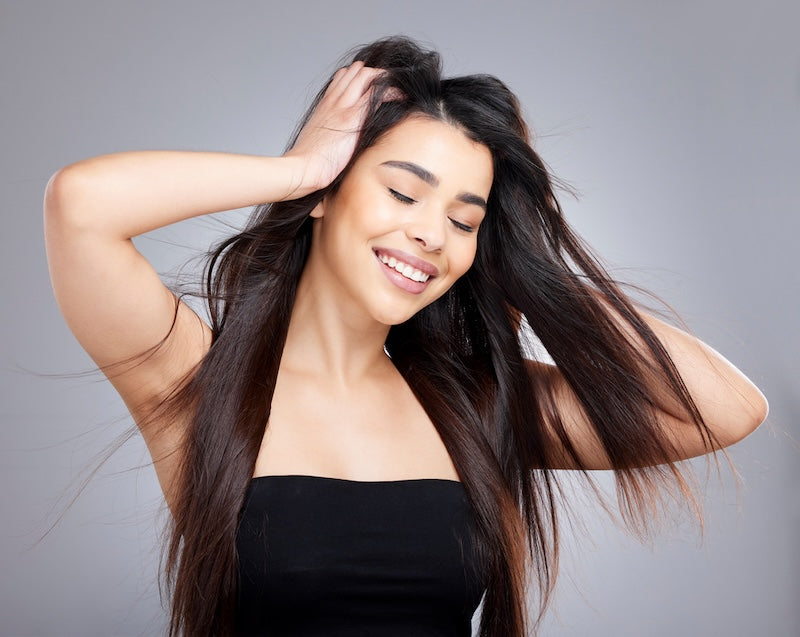You’ve likely heard that biotin is the go-to supplement for hair growth. Many pills, gummies and even shampoos containing this nutrient claim to strengthen hair quality and prevent hair thinning.
As such, this B vitamin has gained widespread popularity in the beauty and wellness industry. But does the scientific evidence support biotin’s role in hair health?
This article explores the evidence behind biotin’s benefits for hair growth, who may benefit most from supplementation, and the optimal dosage for achieving results. Let’s break down what the research really says and whether biotin supplementation deserves a spot in your hair care routine.
Understanding Biotin and Its Role in Hair Health

Biotin, also known as vitamin B7, is a water-soluble vitamin found in many foods such as sweet potatoes, eggs, fish, seeds, and nuts. By being water-soluble, this vitamin dissolves in water, is not stored in the body, and excess consumption is excreted through urine.
Because of this, proper intake of biotin is essential. However, biotin deficiency is rare, as it is found in a variety of foods and is even produced by a healthy gut microbiome.
Biotin acts as a cofactor for carboxylases that are crucial in the metabolism of proteins, carbohydrates, and fatty acids. By helping to break down these nutrients, biotin indirectly helps to support further protein synthesis.
This is a crucial step in the production of keratin, which is the main structural protein that makes up hair.
Evidence-Based Benefits of Biotin for Hair Growth

Although biotin supplementation is widely marketed for hair growth, scientific evidence supporting its benefits in individuals without a deficiency remains limited. However, ensuring adequate biotin intake through a balanced diet, including foods like eggs, nuts, and leafy greens, can support overall hair health.
However, one scientific review evaluated eighteen studies on biotin supplementation and hair or nail growth. Researchers found that in all eighteen of these cases, the participants had an underlying condition that explained their poor hair or nail development.
This suggests that biotin supplementation can be useful in those that already experience hair loss or biotin deficiency. However, the current research is limited on if there is any effect of biotin supplementation on individuals that are not deficient in biotin.
Even still, biotin supplementation is generally safe for most individuals without causing harm, but it might not be helpful either.
Determining the Optimal Biotin Dosage
According to the National Institute of Health, the adequate intake levels of biotin are as follows:
|
Age Group |
Daily Biotin Intake (mcg/day) |
|
Infants (0-6 months) |
5 |
|
Infants (7-12 months) |
6 |
|
Children (1-3 years) |
8 |
|
Children (4-8 years) |
12 |
|
Children (9-13 years) |
20 |
|
Teens (14-18 years) |
25 |
|
Adults (19+ years) |
30 |
|
Pregnant |
30 |
|
Breastfeeding |
35 |
Many biotin supplements contain way more than the recommended daily intake with levels ranging from 5,000-10,000 mcg per serving. Since biotin is a water soluble vitamin and excess amounts are excreted in the urine, these high doses are generally considered safe.
However, there is no scientific evidence that consuming more than the daily recommended intake will impact hair health in individuals without a biotin deficiency.
Factors that Influence Biotin Dosage
-
Biotin Deficiency - While rare, a true biotin deficiency is possible. This would require supplementation of 300-10,000 mcg per day under medical supervision.
-
Age - Older, pregnant, and breastfeeding women require more biotin levels due to their increased metabolic demands.
-
Hair Condition - People with thinning hair due to a deficiency, may see improvements with supplementation. However, as discussed, those with normal biotin levels will likely not see enhanced hair growth from supplementation.
Long-Term Effects of Biotin on Hair Quality
For those with a biotin deficiency, biotin supplementation may be helpful. However, the current research lacks any clarity on if biotin supplementation in individuals with adequate levels of biotin is helpful.
In general, biotin supplementation is largely regarded as safe. However, some research shows that too much biotin causing an overdose can lead to negative symptoms such as insomnia, frequent urination, and excessive thirst.
Additionally, like with all supplements, make sure your healthcare provider is aware that you are taking it as it can interfere with other medications you have been prescribed.
Can Biotin Prevent Hair Loss?

Biotin supplementation is likely only beneficial in those with existing nutrient deficiencies. Biotin deficiency can result from a few conditions:
-
Biotinidase deficiency
-
Frequent antibiotic use
-
Chronic alcohol use
-
Inflammatory bowel diseases.
In the case of biotinidase deficiency, this genetic disorder prevents individuals from reusing and reabsorbing biotin in the body. This condition requires constant monitoring of biotin levels, frequent consumption of biotin-rich foods, and biotin supplementation.
Frequent antibiotic use, chronic alcohol use, and inflammatory bowel diseases can have a role in biotin deficiencies as they impact the microbiome, preventing the natural production of biotin in the gut.
For optimal results, biotin should be supplemented as needed rather than in excessive amounts. If hair issues persist despite adequate intake, other underlying causes such as iron deficiency, stress, or hormonal imbalances should be considered.
Conclusion
While biotin is often marketed as a miracle solution for hair growth, the current scientific evidence suggests its benefits are primarily seen in individuals with a nutrient deficiency. Since biotin plays a key role in keratin production, adequate intake supports overall hair health, but supplementation beyond recommended daily levels is unlikely to provide additional benefits.
For most people, a balanced diet rich in biotin-containing foods like eggs, nuts, and leafy greens is sufficient. If hair thinning persists, biotin supplementation may be helpful, but it’s important to consider other potential causes, such as other nutrient deficiencies, stress, or hormonal imbalances.
Lifestyle factors like sleep, hydration, and overall nutrition also play a crucial role in hair health. As always, consult with a healthcare provider before starting any new supplement to ensure it aligns with your individual needs.






